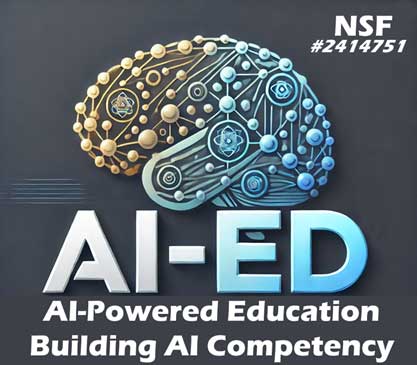Effectively Integrating Artificial Intelligence Into High School Classrooms

Ibrahim Zeid, professor of mechanical and industrial engineering, Claire Duggan, executive director of the Michael B. Silevitch and Claire J. Duggan Center for STEM Education, and Associate Teaching Professor Jennifer Love led a week-long professional development program for twelve local high school STEM teachers, funded by a three-year $400,000 NSF grant titled “Modernizing Education: Using AI to Improve Students’ Learning and Build Skills for the Future.” The Boston campus workshops covered AI fundamentals, policy landscapes, ethical practices, generative AI tools, AI-informed lesson planning and AI-powered assessment. Teachers developed individual AI Action Plans and learned prompt engineering strategies to transform their classroom instruction. The participating educators will meet monthly as a cohort throughout the school year as AI ambassadors in their districts, helping create a scalable model for statewide implementation.  Additional speakers included Associate Dean of Teaching, Learning, and Experiential Susan Freeman, College of Professional Studies Teaching Professor Chris Unger, and Associate Dean of Use-Inspired Research & Development Allison Ruda of the AI Learn Lab. The initiative represents the grant’s first professional learning community aimed at integrating artificial intelligence into K-12 STEM education across Massachusetts.
Additional speakers included Associate Dean of Teaching, Learning, and Experiential Susan Freeman, College of Professional Studies Teaching Professor Chris Unger, and Associate Dean of Use-Inspired Research & Development Allison Ruda of the AI Learn Lab. The initiative represents the grant’s first professional learning community aimed at integrating artificial intelligence into K-12 STEM education across Massachusetts.
This article originally appeared on Northeastern Global News. It was published by Alena Kuzub. Main photo: First cohort of Massachusetts K-12 educators joined in July Northeastern program focused on integrating AI in high school education. Photo by Alyssa Stone/Northeastern University.
New Northeastern initiative prepares STEM educators for effective AI integration into high school
As artificial intelligence transforms how people work and learn, Northeastern University has launched a new initiative to help STEM educators bring AI into high school classrooms.
This summer, Northeastern welcomed its first cohort of Massachusetts teachers and administrators to a professional development program focused on integrating AI in high school education.
Funded by the National Science Foundation, the program equips educators with knowledge, tools and support to help students thrive in an AI-driven world.
“When students have careers, they’re going to be using it in lots of different ways,” says Matt Costa, director of STEM disciplines at Revere Public Schools. “So, how can we thoughtfully build it up?”
But AI in education can be a polarizing topic, says Kathleen Bateman, program director for science at Boston Latin School.
“When we have these conversations in our schools and in our districts, everyone assumes there’s an agenda, that someone’s trying to either be pro-AI or anti-AI,” she says. “You can’t really take a minute to catch your breath and explore the tools.”
That’s why Bateman and Costa joined the Northeastern-led program. It aims to provide STEM educators with the skills and time to engage critically with AI tools — and with each other — on how best to implement them.
“This opportunity has allowed us to speak with people from all different sizes of schools and school districts and talk about how it would impact all levels of learners, students with learning differences, students where English is not their first language, and it’s just given us the time to breathe and … think critically about our own institutions,” Bateman says.
Bridging policy gaps in AI education
Northeastern’s three-year initiative aims to build a professional learning community for STEM teachers across Massachusetts. The goal is to create a network where educators can exchange ideas, support one another and advocate for equitable and responsible integration of artificial intelligence in the classroom.
Each summer, about 10 teachers from across the state will be selected to participate. The inaugural cohort, which completed its training in July, included 12 educators. Their experience began with modules on the history and fundamentals of AI, followed by an intensive week of training and a year-long series of monthly sessions with ongoing content support.
“The teachers’ attitude changed 180 degrees at the end of this summer’s institute,” says Ibrahim Zeid, professor of mechanical and industrial engineering at Northeastern.
Zeid applied for the program’s NSF funding and led training sessions for the teachers.
“They became very knowledgeable in AI and prompt engineering, and available AI tools,” he says. “The AI for educators program enables transition to an AI-based pedagogy. K-12 STEM education must keep pace with industry where major companies are racing to develop and use generative AI tools.”
Read full story at Northeastern Global News